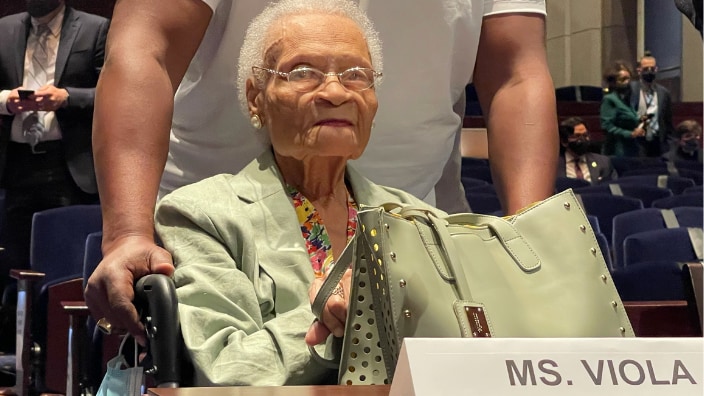Tulsa Race Massacre survivors deliver emotional pleas to Congress at hearing
EXCLUSIVE: Tulsa survivors Mother Viola Fletcher and Hughes Van Ellis testified to members of Congress on Thursday to share the atrocities they experienced 100 years ago
“I hear the screams. I have lived through the massacre every day. Our country may forget this history, but I cannot,” said Mother Viola Fletcher, one of the oldest living survivors of the massacre at a powerful congressional hearing on the 1921 Tulsa massacre.
Mother Viola Fletcher testifies to Congress on what she endured as a survivor of the Tulsa Race Massacre of 1921. (Photo: Jessica Floyd)
Survivors of the Tulsa Race Massacre testified to members of Congress on Thursday to share the atrocities they experienced 100 years ago. In the backdrop of their testimony lies the continuing public health crisis of COVID-19 and a federal government still grappling with a coordinated attack on the Capitol and all who roamed the halls on Jan. 6, 2021.
Fitting the context of the historic importance of the survivors’ testimonies during a year when reparations for Black American victims of racial violence has become a high-ranking political issue across the country, the hearing before the U.S. House Subcommittee on the Constitution, Civil Rights, and Civil Liberties was housed in a large auditorium of the Capitol Visitor Center and broadcasted live online.
Read More: Oklahoma governor booted from Tulsa Race Massacre commission
The location of the hearing is significant for two reasons. It speaks to the focus the country is putting on seeking atonement for racial wrongs of the past, and gives the public an idea of how the commission proposed through H.R. 40 could be implemented if passed. This latter is a position raised by many human rights advocates.
“There is a clear call for what’s right,” said Dresien Heath, a researcher and advocate at the Human Rights Watch. “They are mourning the loss of opportunity. By passing H.R. 40, the commission to study and develop reparations proposals for African Americans, and by administering full revenue at the federal, state and local level for the Tulsa race massacre in it’s continuing impacts, this country can finally recognize the full humanity of Black Tulsans.”
Wikimedia: Tulsa Race Riot
Mother Fletcher traveled to Washington to share her memories of the darkest days of her 107 years of life. She said she still sees the Black men getting shot in the streets, hears the screams and smells the fire of the burning businesses.
“When my family was forced to leave Tulsa, I lost my chance of an education. I never finished school past the fourth grade,” said Fletcher. “I have never made much money in my country.
The long-term impacts of the massacre on her life detail why many consider the massacre a prime example of why the United States needs a commission to study the impacts of slavery and cases for reparations.
Despite the destruction of their community, many survivors fought in World War II. Mother Fletcher’s brother, Hughes Van Ellis, is one such survivor. He lived through racial violence and served his country in segregated units, only to confront the reimagining of his trauma.
“The courts in Oklahoma wouldn’t hear us. The federal courts said we were too late,” said Van Ellis. “We were shown that in the United States that not all men were equal under the law.”
Hughes Van Ellis testifies to Congress on what he endured as a survivor of the Tulsa Race Massacre of 1921. (Photo: Jessica Floyd)
In the middle of his testimony, Ellis broke down in a tearful plea to the committee asking for them to help the government prove his belief that America “will do the right thing.”
“Please do not let me leave this earth without justice like all the others,” Ellis requested.
At the top of the hearing, Rep. Jim Jordan shared his view on the strides the country has made since the massacre. He departed from the hearing during the third survivor testimony from Mother Randle.
In the Republican’s statement, he offered another take on the purpose of the hearing, which he said is “to reflect on our progress as a nation since the Tulsa massacre.”
Rep. Jim Jordan, (R-OH) (Photo by Stefani Reynolds-Pool/Getty Images)
“America, while not perfect, is an exceptional country. It’s the best country in the history of the world,” Jordan added.
Legal representatives of the survivors contend Jordan’s comments demonstrate the gaslighting that has built frustration among survivors, descendants and supporters since their pursuit of reparations first began 100 years ago in the days following the massacre.
“For 70 years, the City of Tulsa, and then its Chamber of Commerces told us that the massacre didn’t happen,” Fletcher explained. “Like we didn’t see it with our own eyes.”
Have you subscribed to theGrio’s “Dear Culture” podcast? Download our newest episodes now!
TheGrio is now on Apple TV, Amazon Fire and Roku. Download theGrio.com today!
The post Tulsa Race Massacre survivors deliver emotional pleas to Congress at hearing appeared first on TheGrio.

